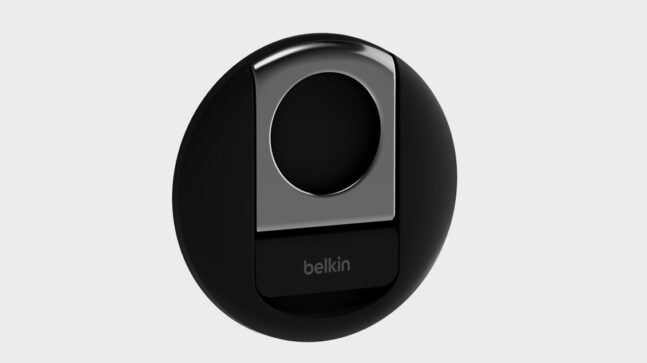It’s unfortunate that the term “planned obsolescence” has so naturally worked its way into our vocabulary. But, more often than not, it appears that the tech world requires users to commit to buying newer, better technology once the current one no longer works. Thankfully, there are designers and engineers committed to rethinking the current model and crafting technology that evolves with the world. When we stumbled across the Biscuit Wireless Charger on Kickstarter, we assumed it was yet another run-of-the-mill Qi charger. Stylish to be sure, but we’d seen dozens of the same.
But, upon closer inspection, we were thoroughly impressed with the Biscuit. Unlike most other wireless chargers on the market right, the Biscuit is crafted with zirconia, an extremely durable material that is scratch-resistant and long-lasting. Zirconia (or zirconium dioxide) is most commonly used in aerospace and industrial engineering but has also been used by top-tier watchmakers. Additionally, the use of plastics has been minimized and they are completely recyclable. Best of all, the simple, thoughtful construction of the Biscuit means that users will be able to swap out the tech as materials and processes upgrade over time. All of the components are independent meaning that you could completely disassemble the Biscuit down to each individual piece. This seems like a small detail but founder Charles Duffy was adamant that Biscuit should grow with the times. “If anything goes wrong over time, you can replace only what’s needed instead of disposing of the device,” Duffy shares on the Kickstarter page. “Also as the Qi standard evolves — wherever technologically possible — we will release an updated core to supplant its predecessor.”
It’s this ability to upgrade the Biscuit that ultimately won us over. Wireless charging is still a relatively new area for the modern consumer so it stands to reason that the tech will grow and evolve. Rather than having to toss every single charger we own, we’d our devices grow with us. When new tech is available, Duffy expects to make it available for purchase directly from Biscuit. “I will expect it to be a charged service, but of course, it will be significantly cheaper than purchasing a whole device,” he explains to us. “A big factor in the material decisions is that I wanted utility and the materials to hold value over time.”
Plus, the design for the Biscuit is understated and elegant. Available in three colorways (Cool Grey, Panda, and Graphite), Biscuit will look sharp and stylish on any desk or table. And, the minimalist approach means it doesn’t take up too much real estate. Plus, take a look at the subtle “Biscuit” lettering on the charger itself. Classy.
Eventually, Duffy hopes to add to the Biscuit lineup. “I have a roadmap for other Biscuit-related products, and products within a general ecosystem,” he says. “For Biscuit itself, I’ve been seeing some demand in adding magnets so that it locates with the latest iPhones. I’ll keep monitoring demand and if it looks like something many would go for I’ll release a retrofit.” That’s the beauty of the Biscuit. Duffy can continue developing and upgrading with options for each use case. Additionally, we could see additional color options and finishes in the future. “I’m looking forward to experimenting with some other really exciting materials and finishes,” Duffy shares. “I just purchased some erbium oxide, which is a pastel pink pigment, that I’m going to experiment with adding to the zirconia.”
At the time of publication, the Biscuit has already quadrupled its funding goal with more than 20 days remaining. Kickstarter users could get significant discounts on the MSRP with the early bird option ($61) or the general Kickstarter price ($100). While the Biscuit might sound pricier than some competitors, the quality of its materials more than makes up for the cost. Duffy expects the Biscuit to begin shipping either end of September or early October.









